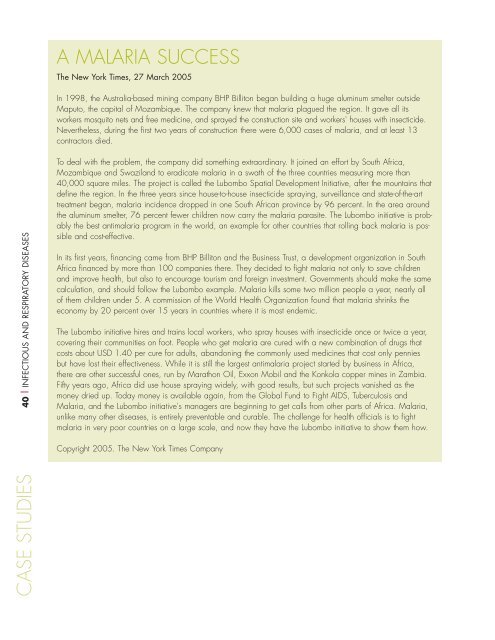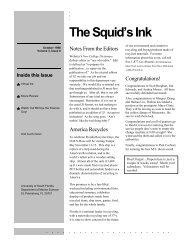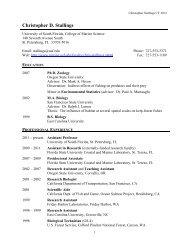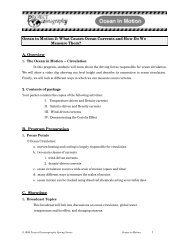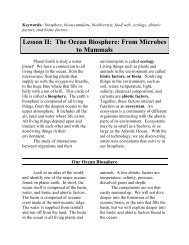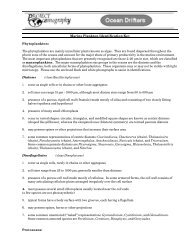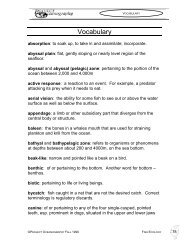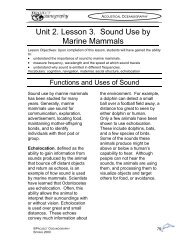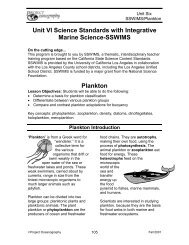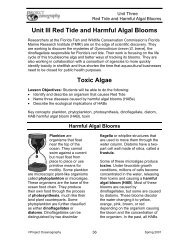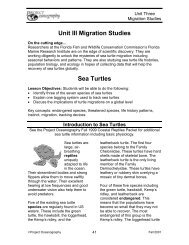Climate change futures: health, ecological and economic dimensions
Climate change futures: health, ecological and economic dimensions
Climate change futures: health, ecological and economic dimensions
You also want an ePaper? Increase the reach of your titles
YUMPU automatically turns print PDFs into web optimized ePapers that Google loves.
A MALARIA SUCCESS<br />
The New York Times, 27 March 2005<br />
In 1998, the Australia-based mining company BHP Billiton began building a huge aluminum smelter outside<br />
Maputo, the capital of Mozambique. The company knew that malaria plagued the region. It gave all its<br />
workers mosquito nets <strong>and</strong> free medicine, <strong>and</strong> sprayed the construction site <strong>and</strong> workers' houses with insecticide.<br />
Nevertheless, during the first two years of construction there were 6,000 cases of malaria, <strong>and</strong> at least 13<br />
contractors died.<br />
40 | INFECTIOUS AND RESPIRATORY DISEASES<br />
To deal with the problem, the company did something extraordinary. It joined an effort by South Africa,<br />
Mozambique <strong>and</strong> Swazil<strong>and</strong> to eradicate malaria in a swath of the three countries measuring more than<br />
40,000 square miles. The project is called the Lubombo Spatial Development Initiative, after the mountains that<br />
define the region. In the three years since house-to-house insecticide spraying, surveillance <strong>and</strong> state-of-the-art<br />
treatment began, malaria incidence dropped in one South African province by 96 percent. In the area around<br />
the aluminum smelter, 76 percent fewer children now carry the malaria parasite. The Lubombo initiative is probably<br />
the best antimalaria program in the world, an example for other countries that rolling back malaria is possible<br />
<strong>and</strong> cost-effective.<br />
In its first years, financing came from BHP Billiton <strong>and</strong> the Business Trust, a development organization in South<br />
Africa financed by more than 100 companies there. They decided to fight malaria not only to save children<br />
<strong>and</strong> improve <strong>health</strong>, but also to encourage tourism <strong>and</strong> foreign investment. Governments should make the same<br />
calculation, <strong>and</strong> should follow the Lubombo example. Malaria kills some two million people a year, nearly all<br />
of them children under 5. A commission of the World Health Organization found that malaria shrinks the<br />
economy by 20 percent over 15 years in countries where it is most endemic.<br />
The Lubombo initiative hires <strong>and</strong> trains local workers, who spray houses with insecticide once or twice a year,<br />
covering their communities on foot. People who get malaria are cured with a new combination of drugs that<br />
costs about USD 1.40 per cure for adults, ab<strong>and</strong>oning the commonly used medicines that cost only pennies<br />
but have lost their effectiveness. While it is still the largest antimalaria project started by business in Africa,<br />
there are other successful ones, run by Marathon Oil, Exxon Mobil <strong>and</strong> the Konkola copper mines in Zambia.<br />
Fifty years ago, Africa did use house spraying widely, with good results, but such projects vanished as the<br />
money dried up. Today money is available again, from the Global Fund to Fight AIDS, Tuberculosis <strong>and</strong><br />
Malaria, <strong>and</strong> the Lubombo initiative's managers are beginning to get calls from other parts of Africa. Malaria,<br />
unlike many other diseases, is entirely preventable <strong>and</strong> curable. The challenge for <strong>health</strong> officials is to fight<br />
malaria in very poor countries on a large scale, <strong>and</strong> now they have the Lubombo initiative to show them how.<br />
Copyright 2005. The New York Times Company<br />
CASE STUDIES


